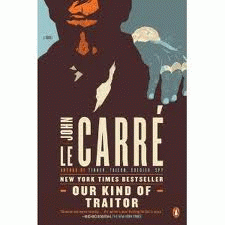/>
Book Review
Most American readers are vaguely familiar with British spy novelist John LeCarre's cold war thrillers about KGB spies. A Spy who Came in from the Cold; Tinker, Tailor, Soldier, Spy and Smiley's People are the best known. I myself prefer his post-1990 espionage novels, which pit principled intelligence operatives against government and corporate corruption. Despite an international literary standing on a par with William Faulkner's, LeCarre's more recent work is less well known. Corporate media critics don't like it. I find this a great pity. LeCarre's exquisite craftsmanship, like Faulkner's, continues to ripen with maturity. As a psychiatrist, I especially enjoy his vivid characterization. I often feel I have met his characters somewhere, either in my office or one of the political groups I work with.
LeCarre pulls no punches in describing the takeover of British and US intelligence by a corrupt criminal element, supported by even more corrupt corporate and government sponsors. The Constant Gardener (which has been made into an exquisite film by the same name) is about a drug company that conducts illegal drug trials in Africa and bumps off a local doctor and British journalist who try to expose them -- and the higher ups in British and US intelligence who protect the drug company. A Most Wanted Man, set in Germany, is about a devout Muslim and the idealistic female lawyer who tries to prevent him from being deportation. It's also about the sinister new fad of contracting out covert assassinations and other criminal acts to (totally unaccountable) private intelligence contractors.
The Transformation of British and US Intelligence into Criminal Gangs
LeCarre himself is a former intelligence officer for MI5 and MI6. His unflattering depiction of US and British intelligence in his novels suggests a high level of disgust at the transformation of two of the world's greatest intelligence networks into glorified criminal gangs. This attitude comes through loud and clear in Our Kind of Traitor, his darkest and most gut-wrenching novel yet. The subject of the book is the Russian mafia and their cozy relationship with the international banking establishment -- and how both British and US intelligence are used to protect this relationship. The "traitor" in this instance is a high officer in the British government, and the story line concerns the curious way officials in the British Foreign Office close ranks around him, greedy for the infusion of illicit cash (from drug dealing, arms smuggling, paid assassinations, etc) to help the failing British economy.
As with all his novels, Our Kind of Traitor is very systematically researched with the help of Russian mafia experts. And as usual, there are two crusading spirits who, for their own complex psychological reasons, endeavor to expose this corruption. Without being a plot spoiler, let me say that Le Carre feels no compulsion whatsoever to give his readers a happy ending. At the same time, he's a master story teller who keeps you hanging till the very last page.






